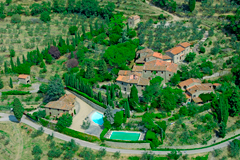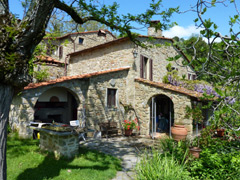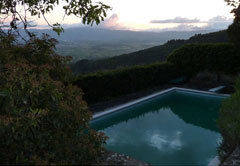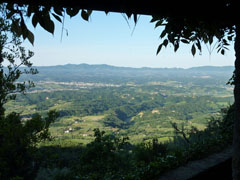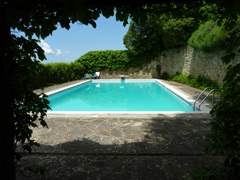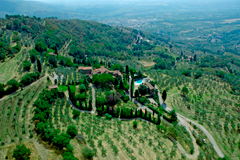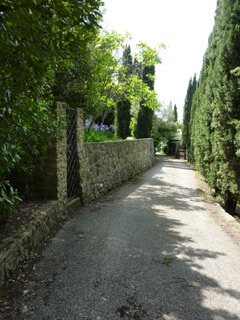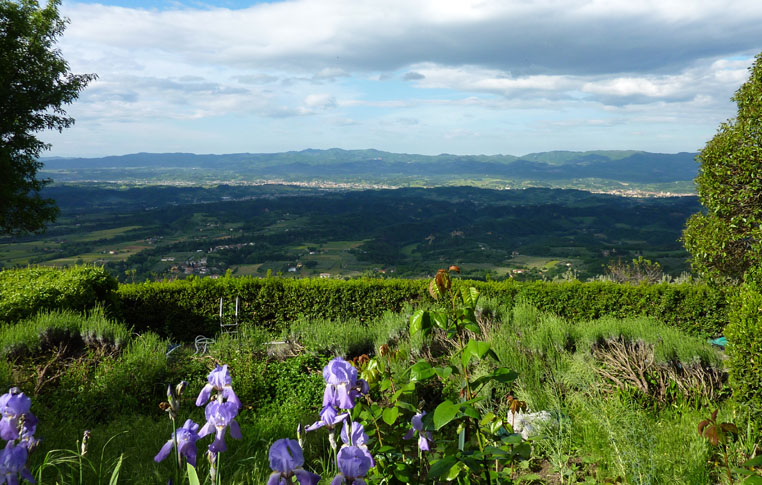
View from the terrace
For full information on this beautiful villa please contact:
Burton Anderson
Località Querceto 25
Frazione Oliveto
52024 Loro Ciuffenna (AR) Italy
Email: info@tuscanydreamhome.com
Cell (preferred): +39-320 027 7694. Home phone: +39 055 917 2454, or +39 056 456 9647.
If dialing from the UK or any other European country: (Cell/Mobile) 00 39 320 027 7694, (Home) 00 39 055 917 2454, or +39 056 456 9647
If dialing from the United States: (Cell/Mobile) 011 39 320 027 7694, (Home) 011 39 055 917 2454, or +39 056 456 9647.
Notes on Buying Property in Italy
Procedures:
It is important to use an independent legal adviser to act in all property transactions. If the buyer is not Italian it is a good idea to engage a legal representative who speaks the same language as the buyer. The first written step in the purchase process is the proposal of purchase (compromesso, or proposta d’acquisto), by which the buyer binds himself for a stipulated period (normally from five to 30 days) to buy the property at a named price. During this time, the vendor and his agent are free to consider other offers.
When the offer is accepted, the buyer pays a deposit (usually 10 per cent), and the preliminary contract of sale (compromesso di vendita) is drawn up by a notary (notaio), who acts for both sides. This sets out the formalities of the sale, including any conditions. If the purchaser breaches the contract, he may forfeit his deposit. If the vendor does so, he must pay the buyer twice the amount of the deposit. At completion (usually around six to eight weeks later), the title to the property passes from the vendor to the buyer by a deed of sale (il rogito).
There are two types of deed. One is a public document and the other a private contract. The former provides greater protection and is slightly more expensive. If a property bought by private deed is subsequently found to have a charge against it (such as a mortgage), the notary cannot be held responsible, whereas if a public instrument has been used, legal action can be taken against him. Following completion, the notary issues a certified copy of the deed of sale and registers the original document with the Land Registry.
Costs:
Many properties in Italy are freehold. The total fees for buying a property are approximately 10 to 20 per cent of the purchase price. Among the costs are:
- Registration fee
- Land Registry fees/stamp duty
- Notary fees (generally about 4 per cent of the declared price)
- Legal fees (for independent legal advice)
- Estate agent’s fee (usually shared between vendor and purchaser)
- Mortgage fee (if applicable)
- IVA (Italy’s Value Added Tax), if buying from a company
- State tax, if buying from a private individual
Financing your purchase:
When working out how to finance your property purchase, consider all the options. Paying cash, if that is convenient, is often recommended, but you may not want to tie up a relatively large sum in this way. The other options are re-mortgaging your home in your native country or arranging a mortgage on your Italian property through a US, UK, Italian or other lender. Remortgaging offers the easiest solution. Releasing equity in a non-Italian home means that the second home can be purchased for cash, without the need for another mortgage. However, this may only be feasible for those who own their first home outright or alternatively enjoy a favorable debt to equity ratio. Historically, US and UK mortgage providers have lent funds of up to 80 per cent of the purchase price for a second home purchase over, typically, a 15-year term.
Getting a mortgage in Italy:
Bear in mind that a mortgage in a foreign currency can be something of a gamble. Currency markets are volatile, and there is always the possibility of getting your fingers burned if the currency moves against you. The procedure for obtaining a mortgage from an Italian lender can be lengthy and complex. Mortgages in Italy are based on the property, and self-certification mortgages are not generally available. Borrowing limits are normally based on 30 per cent of monthly income. Projected rental income will not be taken into account. Proof of income and outgoings will have to be shown. If total outgoings exceed 40 per cent of monthly income, Italian lenders will not be interested in doing business. Also, chances are that the lender will set the term of the mortgage at around 10 or 15 years. It’s quite possible that they will expect the loan to be repaid by the borrower’s 70th birthday. It may even be that they’ll make it to the 65th birthday. The Italian economy has been facing difficulties recently. Growth is low, and inflation has been rising. It is worth considering whether better terms can be obtained for financial sources outside Italy.
Taxation:
- General: Everybody who has financial transactions in Italy must have a tax ID number (codice fiscale) and file the appropriate tax forms. However, many countries such as the UK and the US have a double taxation treaty so tax is payable in one or other country, not both. Non-residents may be liable for taxes on income, capital gains and inheritance. Obviously, these vary from individual to individual, and it’s important to take professional advice. Unlike France, there is no wealth tax in Italy. The authorities are only concerned with Italian-sourced income. This includes interest on funds deposited with an Italian bank and income from letting a property in Italy. In the case of the latter, it is possible to offset expenses (including repairs to the property, management costs and so on) against income. The residue is taxed at between 19 and 46 per cent, depending on the amount. Most property owners will pay around 30 per cent.
- Personal taxation: residents For tax purposes, anyone staying in Italy for more than 183 days during a tax year (which coincides with the calendar year) is considered a resident. The 183 days need not be consecutive. Residents may be liable for taxes on income, capital gains and inheritance. Like many bureaucratic areas of Italian life, the taxation system is extremely complex, and it is essential to take expert advice from a commercialista. Anyone thinking of buying a property in Italy should examine their tax status carefully. By doing so, they may well be able to save money in the future.
- Local taxes: Every town council (commune) raises a tax called imposto municipale or imposta comunale sugli immobili (ICI) on property. This is based on the property’s rendita catastrale (rateable value), and is usually between 0.4 and 0.7 per cent. The other tax that is raised locally is called tassa comunale. This funds refuse disposal, cleaning of streets and beaches, and so on.
